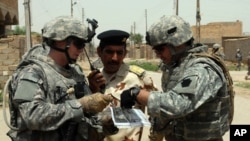U.S. military officials say the drawdown of U.S. troops in Iraq continues as Washington and Baghdad grapple with the dilemma of whether a smaller training force should remain in the country past a December deadline.
The United States says it will consider leaving some troops behind to train Iraqi security forces, but only if Iraq requests it. Iraqi leaders have been slow to issue a decision.
They are juggling conflicting demands. There are popular calls for all foreign troops to leave their country. Yet many people fear that without an outside force, their country might plunge deeper into sectarian violence and expose it to interference from neighboring Iran.
News reports this week quote unidentified U.S. military sources as saying the Pentagon supports leaving several thousand troops in place.
Defense Department spokesman George Little declined to comment on Thursday on what he said are ongoing talks between the United States and Iraq.
“Absolutely no decisions have been made whatsoever with respect to the post-2011 U.S. presence in Iraq," said Little. "This is a series of discussions that is ongoing with the Iraqi government and anybody who thinks they can pin a precise number on what the U.S. troop presence in 2012 might be is engaging in pure speculation.”
About 45,000 U.S. troops are in Iraq and President Obama has pledged to have them all out by December 31st, under a 2008 security agreement with the Iraqi government.
U.S. Navy Captain John Kirby says the pullout is on track. At the same time, he says, there is reason for U.S. forces to stay.
“We’ve long said there are some gaps in their [Iraq's] military security capabilities that we believe we could offer some assistance with," said Kirby. "And we’re waiting for them to come back and let us know what they think those gaps are and what they might require.”
Three years ago, the United States and the Iraqi leaders agreed on a pullout this year based on the expectation that the Iraqi government would have made progress in developing its governance and defense capabilities.
Anthony Cordesman, an analyst at the Washington-based Center for Strategic and International Studies, says progress did not happen as planned due in part to Iraq's 2008 budget crisis.
“Among other things, they had to freeze manpower [and] they couldn’t improve forces," said Cordesman. "There were a whole series of cutbacks that left them less capable than they planned to be as we left. This also is compounded by an election process, which long before the actual election, presented serious problems. We still don’t have after all this time a real minister of the interior or defense, or a national security adviser.”
The senior U.S. commander in Iraq earlier proposed keeping as many as 14,000 to 18,000 troops in the country. The New York Times newspaper this week quoted a senior military official as saying that Defense Secretary Leon Panetta recommends keeping 3,000 or 4,000 U.S. troops in Iraq.
Anthony Cordesman says that given the work still to be done in Iraq, that number might be too small.
“Three to four thousand is a very limited presence for a country this big, with this many needs, with so many existing security problems," he said. "And it will involve significant risks that a larger presence wouldn’t have in terms of the level of training and advice. But there is no magic number here.”
In making a decision, Iraqi leaders will need to balance the risk of having too few U.S. troops remain versus how many the population is willing to keep in the country.
US Continues Troop Drawdown in Iraq Despite Dilemma
- By Luis Ramirez




